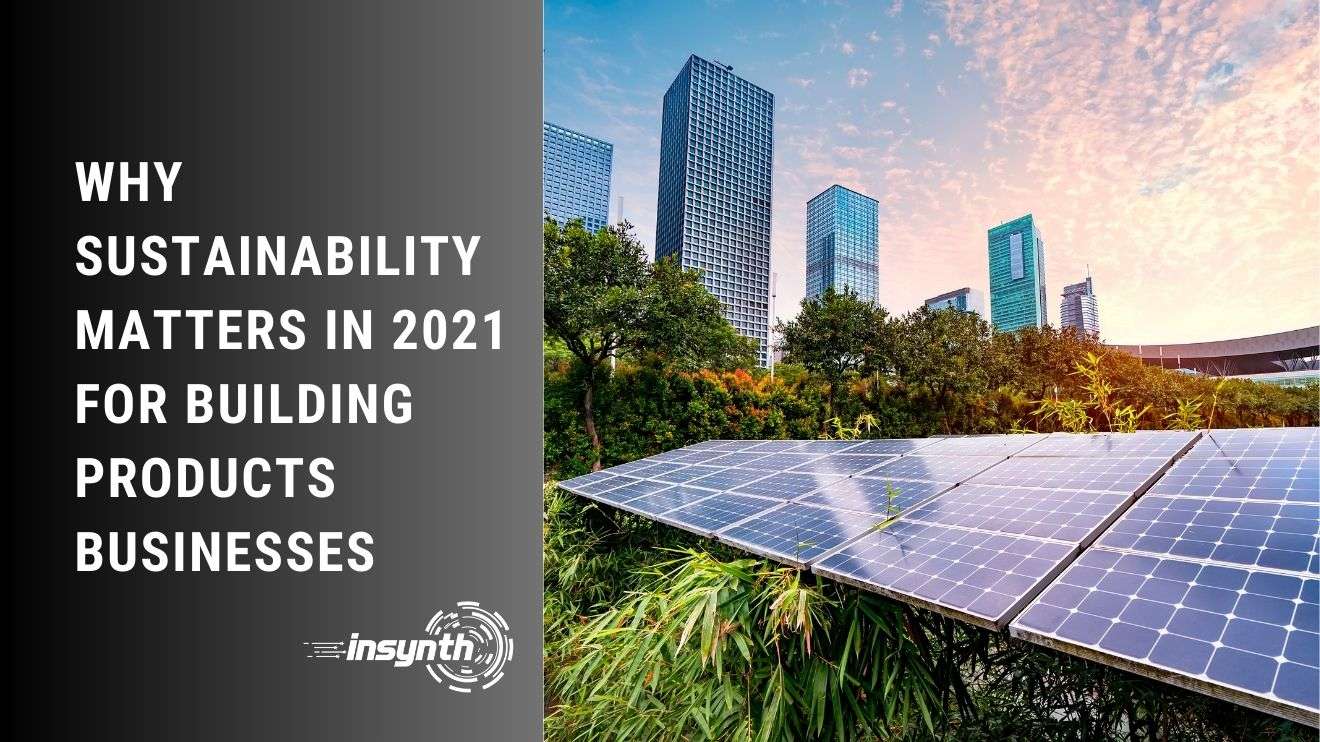3 min read
Why Sustainability Matters In 2021 For Building Products Businesses
Freya Oxton-Grant
:
28-Dec-2020 10:30:00

As we enter 2021, and the rest of the 2020’s, this decade holds a great opportunity for the UK’s construction industry to take action towards improving sustainability in the industry.
As the mounting effects of climate change, a growing world population, and rising levels of urbanisation become more unmistakeable, the need for a sustainable future is becoming increasingly critical.
With the construction and building product industry contributing a significant share of global carbon emissions, energy consumption, and waste production, now is the time to start making smarter and more sustainable decisions, to reap the rewards in the future, and prevent permanent climate damage before it’s too late.
Sustainable buildings are in higher demand than ever with the end-consumers being ever more aware of how important it is, as well as governments across the world pushing for sustainable practices through regulation. One significant regulation being that new UK buildings must be net zero carbon by 2030, and all existing buildings net zero carbon by 2050.
Why Building Product Businesses Might Resist Sustainable Practices
A key issue facing the construction sector is that adopting new sustainable practices can cost significantly more upfront. This impact can be tricky to deal with when trying to make viable bids for projects, especially if in a strongly competitive market.
The World Green Building Trends 2018 Smart Market Report reveals that almost 40% of UK firms reported that affordability was the biggest challenge posed by adopting sustainable construction practices and almost 50% of firms stated that they expected green buildings to incur higher first costs.
However, in the long run it must be considered that cost savings are actually made through the implementation of sustainable methods. Reducing waste and increasing energy efficiency, as well as other sustainable practices, can save your business and the end-user money.
Other benefits of sustainable building products are due to the demand for them that is growing in the market.
Consumers are faced with a climate emergency and want to take a personal responsibility for who supplies them with their buildings and building facilities. According to the report above, 34% of UK firms reporting that they are facing increasing demand for greener buildings.
Why is Sustainable Construction Important?
Sustainable construction aims to reduce the negative impact of the industry’s practices on the environment. Using renewable energy resources, recycling building materials, increasing energy efficiency, and reducing energy consumption and waste, all contribute towards reducing the sector’s carbon emissions and pollution.
Sustainability in the construction and building product industry is incredibly important as it is a significant contributor to climate change and pollution. The construction industry is accountable for:
- 36% of worldwide energy usage
- 40% of the world’s CO2 emissions
- The largest global consumer of natural resources, with half of all raw materials used in the manufacturing of building products, and
- The world’s concrete production results in over 8 billion tonnes of CO2
A shocking statistic which shows the scale of the industry is that in 2020, the world’s human made product mass reached 1.1 teratonnes, which now exceeds the Earth’s entire global biomass. This means that the volume of concrete, asphalt, tarmac, cement, plastic, metal etc. is greater than the entire world’s animal, insect, and marine populations and plant mass.
From this data you can see how crucial implementing more sustainable practices in the industry is, as without them we are on a path to damage and destruction.
Sustainable construction should no longer be the future, but the present, and in 2021 sustainability matters more than ever for building product businesses.
The move to sustainable practices in the industry now will mean businesses will reap the rewards as we continue down this path, with the green building materials market worldwide now estimated to grow to $187 billion by 2027.
And any upfront costs to adopting sustainable methods will most likely result in a stronger return on investment.
According to research, owners of eco and environmentally friendly buildings feel they are worth on average 7% more than traditional buildings, due to the reduced operating costs from improved energy efficiency. This added value will more than likely offset any costs of sustainable construction, meaning there are only benefits to increasing sustainability in the construction sector!
Conclusion
Today’s sustainable construction practices provide an enormous benefit to building product businesses, the end-consumer, and the environment. New innovative tools and technologies and the latest eco design trends provides endless opportunities for construction businesses to adopt sustainable practices and enter the growing market of green building materials.
The ability to create greener, more cost effective and more sustainable buildings is a trend that we can expect to see a whole lot more of in 2021 and beyond.
About Insynth
Insynth Marketing is a leading UK construction marketing agency based in Shifnal in the West Midlands.
They use the latest inbound marketing techniques such as construction inbound marketing, to support building product companies to grow their business by proactively driving sales lead generation activity.
As the only HubSpot certified agency to major on construction marketing, we bring together construction marketing strategy, digital strategy, website design, SEO, content marketing, email marketing, sales automation, marketing automation and HubSpot CRM implementation to produce successful campaigns and great results for our clients.

